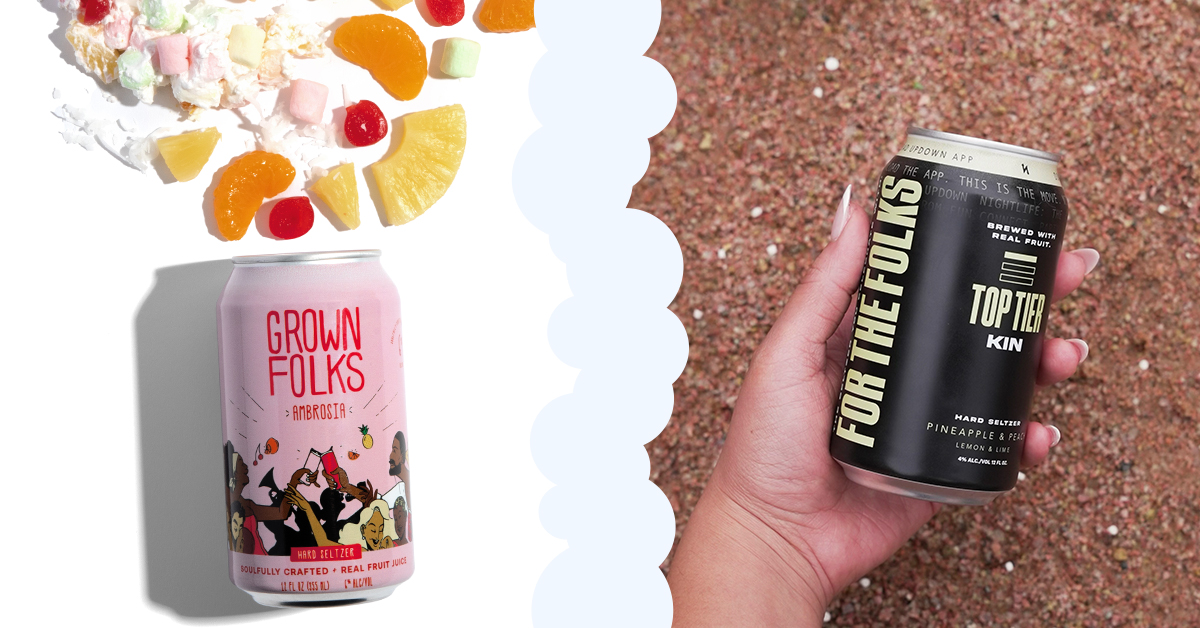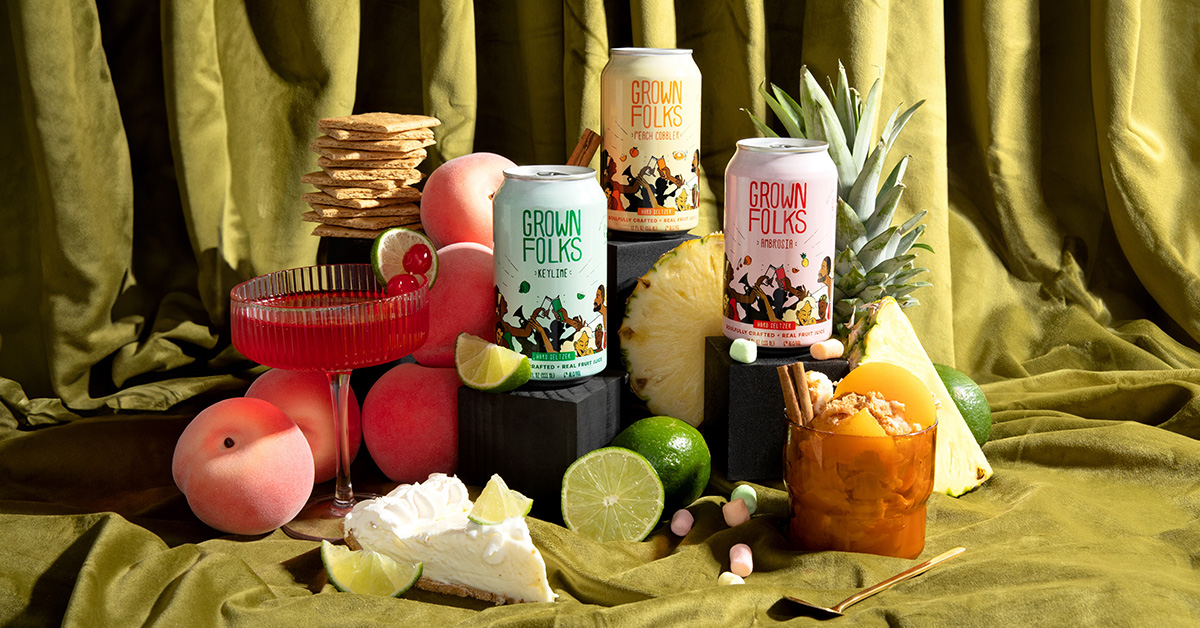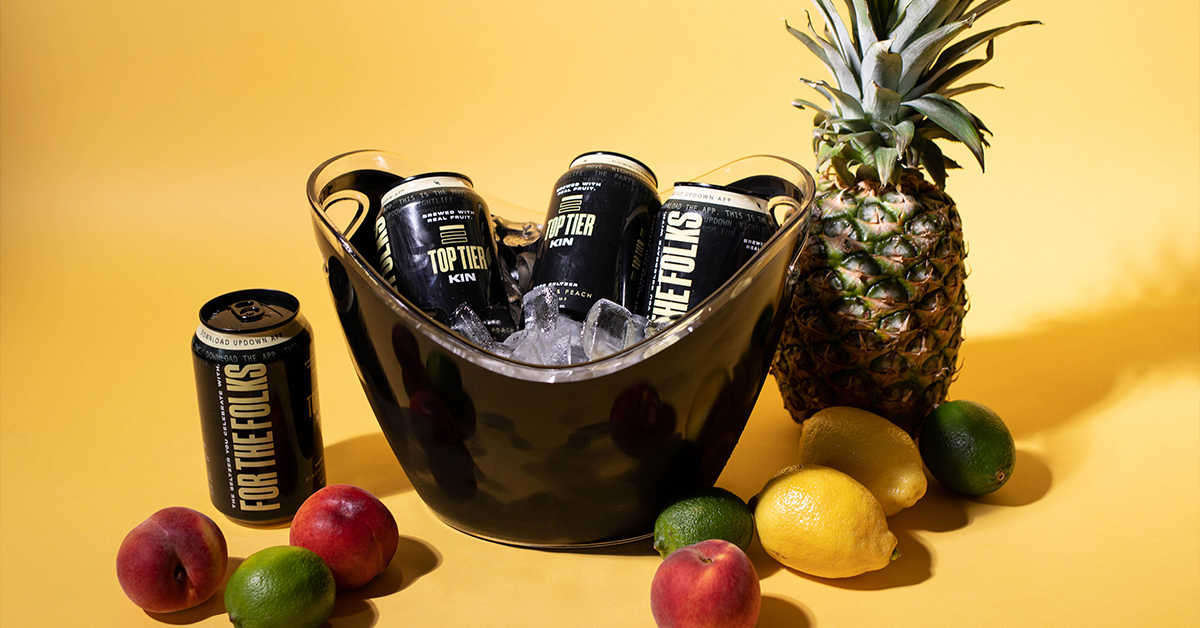
Two brands are positioning themselves as the “first” Black-owned hard seltzer brands hyper-focused on carving out a niche among the Black community.
Hard seltzer is a segment not traditionally positioned toward the Black drinkers, but two brands — Grown Folks and Kin Hard Seltzer — are taking two different approaches to changing that.
For bev-alc startup Grown Folks the goal was to bring more representation to the category as the “first female-owned and black-owned” hard seltzer brand.
“There weren’t any products that spoke to me and my background,” said founder and CEO Danica Dias. “We have Gen Zers and millennials that are the most racially and ethnically diverse generation in history. Consumers more than ever are looking to align with brands.”
At the beginning of February, the Los Angeles-based brand launched its 6% ABV, 12 oz. cans in three varieties — Ambrosia, Peach Cobbler and Key Lime — which lean into Dias’ Louisiana Creole heritage.
“What we’re doing is leading with taste and with culture,” she said. “By offering unapologetically sweet tasting products. We’re appealing to a consumer group that’s looking for something familiar to them. Something nostalgic.”
Dias saw an opportunity in the hard seltzer segment that was dominated by products positioned towards “white millennial health-focused consumers.”

Taking a traditional retail approach, Grown Folks rolled out in its home state of California working with DSD liquor distributor Collier Barnett Distribution to target grocery and independent beer and liquor stores. Currently only in about 10 doors through March, the brand expects to increase that footprint to about 100 locations with deals lined up with select Whole Foods Market, Sam’s Club, Total Wine and Lucky’s. The company hopes to expand to Georgia, its next target market, by the end of the year.
Dias said the strategy she has been building with Lucky’s includes placing Grown Folks case packs next to “like-minded basket items” that align with the drink’s “unapologetic” branding.
“We like what we like and we’re proud of it. If that aligns with chicken, if that aligns with desserts or that aligns with salad, it kind of is what it is in our brand messaging,” she said. “There’s a complete gap in the market that is specifically aligning to Black culture and/or soul food-inspired flavors.”
Other hard seltzers have taken a similar approach. Emerging Asian-inspired brands Nectar and Lunar are using flavors and marketing campaigns that align with cultural cues to identity to drive trial and repeat buyers. Familiar names like Corona, Jose Cuervo and Topo Chico have also jumped on the spiked seltzer craze with varieties that speak to Latinx drinkers.
Hard seltzer has become a mainstay alternative to beer or RTD cocktails in the bev-alc category; yet, consumer interest has softened since its boom in the late 2010s.
Flavored-malt beverage (Boston Beer’s Twisted Tea, Mark Anthony Brands’ Mike’s Hard Lemonade, and Molson Coors’ Simply Spiked) case sales were up 13% and dollar sales increased 17% in the last 52-week period ending December 31, according to omnichannel data from Circana. In the same period, the beer seltzer segment (i.e. White Claw, Truly, Happy Dad) had a -18.2% case sales decline with dollar sales down -13.6%.
Though significantly smaller in volume, the spirits-based seltzer category (dominated by Gallo’s High Noon) has grown both dollar sales and case sales metrics +63.8% year-over-year.
Finding a sweet spot for hard seltzer among Black drinkers, though, might be an uphill climb.
According to a Spring 2023 study conducted by the Collage Group, 54% of Black Americans would prefer to drink a canned cocktail over a hard seltzer. In the same study, 39% of Black people polled in the study said they had never tried some of the leading hard seltzer brands like White Claw and Truly.
Newcomer Kin (not to be confused with non-alc brand Kin Euphorics) is trying to change that by also branding itself as the first Black-positioned hard seltzer with a tagline “For the Folks.” Yet, the Kansas City-based company is using on-premise sales as a way to reach its target consumer.
Launched in May with one variety – featuring four fruits in one: Pineapple & Peach Lemon & Lime — the FMB hard seltzer is a 4% ABV available in 12 oz. cans. Its second flavor, Strawberry Lemonade, recently launched last month.

Backed by a $3 million investment from former Kansas City Chiefs player Dezman Moses, the brand is a partnership between Joshua Lewis, founder of party promotion and nightlife app company Updown; graphic designer Kearra Johnson; and Border Brewing Company founder Eric Martens.
Kin uses the production facility of Border Brewing and the brewery’s state distribution license to self-distribute in Missouri and the greater Kansas City metro area. As the brand expands, Lewis anticipates it will need to build out more space to meet demand.
For now, the company is slowly building its brand awareness and distribution network locally before it drives into new markets in the next year and a half.
Using Lewis’ connections and experience in club and event promotion, Kin is tapping nightlife influencers like bartenders, DJs and promoters in Kansas City to organically build momentum through word-of-mouth. Presently, the brand is behind the bar in 52 on-premise bars, restaurants and clubs while only on retail shelves at four locations, Lewis said.
“I passed some off-premise at the moment, because I really want to be focused on brand awareness and community building because once we build that, the off-premise becomes easier.”
Lewis has positioned Kin in clubs and bars as a Red Bull alternative, sold as a mixer for bottle service as well as behind the bar and on restaurant menus. This strategy moves Kin through on-premise locations freely and drives awareness to a Black consumer base that is not traditionally seeking out a hard seltzer.
“When you think about how the bigger brands like Ciroc or Casamigos built up their marketing, it was through on-premise,” Lewis said. “On-premise is where brands become cool.”